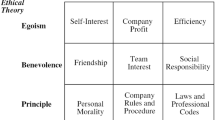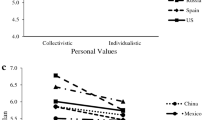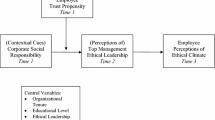Abstract
The purpose of this study was to assess the relationships among ethical context, organizational commitment, and person-organization fit using a sample of 304 young working adults. Results indicated that corporate ethical values signifying different cultural aspects of an ethical context were positively related to both organizational commitment and person-organization fit. Organizational commitment was also positively related to person-organization fit. The findings suggest that the development and promotion of an ethical context might enhance employees' workplace experiences, and companies should consider adopting ethical policies that support principled conduct, punish unethical actions, and increase individual perceptions of an ethical company environment.
Similar content being viewed by others
References
Abelson, M. A.: 1983, ‘The Impact of Goal Change on Permanent Perceptions and Behaviors of Employees’, Journal of Management 9, 65–79.
Adams, J. S., A. Tashchian and T. Shore: 2001, ‘Codes of Ethics as Signals for Ethical Behavior’, Journal of Business Ethics 29, 199–211.
Angle, H. L. and J. L. Perry: 1981, ‘An Empirical Assessment of Organizational Commitment and Organizational Effectiveness’, Administrative Science Quarterly 20, 1–14.
Arbuckle, J. L. and W. Wothke: 1999, AMOS 4.0 User's Guide (SmallWaters Corporation, Chicago).
Babin, B. J., J. S. Boles and D. P. Robin: 2000, ‘Representing the Perceived Ethical Work Climate among Marketing Employees’, Journal of the Academy of Marketing Science 28, 345–358.
Bagozzi, R. P. and Y. Yi: 1988, ‘On the Evaluation of Structural Equation Models’, Journal of the Academy of Marketing Science 16, 74–94.
Bourne, S. and J. D. Snead: 1999, ‘Environmental Determinants of Organizational Ethical Climate: A Community Perspective’, Journal of Business Ethics 21, 283–290.
Bowen, D. E., G. E. Ledford and B. R. Nathan: 1991, ‘Hiring for the Organization, Not the Job’, Academy of Management Executive 5, 35–50
Cable, D. M. and T. A. Judge: 1994, ‘Pay Preferences and Job Search Decisions: A Person Organization Fit Perspective’, Personnel Psychology 47, 317–348.
Caldwell, D. and C. O'Reilly: 1990, ‘Measuring Person-Job Fit Using a Profile Comparison Process’, Journal of Applied Psychology 75, 648–657.
Chen, A., R. Sawyers and P. Williams: 1997, ‘Reinforcing Ethical Decision Making Through Corporate Culture’, Journal of Business Ethics 16, 855–865.
Chonko, L. B. and S. D. Hunt: 1985, ‘Ethics and Marketing Management: An Empirical Examination’, Journal of Business Research 13, 339–359.
Clark, M. A. and S. L. Leonard: 1998, ‘Can Corporate Codes of Ethics Influence Behavior?’, Journal of Business Ethics 17, 619–630.
Delaney, J. T. and D. Sockell: 1992, ‘Do Company Ethics Training Programs Make a Difference?’, Journal of Business Ethics 11, 719–727.
Ferrell, O. C. and J. Fraedrich: 1994, Business Ethics: Ethical Decision Making and Cases (Houghton Mifflin, Boston).
Fogarty, T. J.: 1992, ‘Organizational Socialization in Accounting Firms: A Theoretical Framework and Agenda for Future Research’, Accounting, Organizations & Society 17, 129–149.
Ford, R. C. and W. D. Richardson: 1994, ‘Ethical Decision Making: A Review of the Empirical Literature’, Journal of Business Ethics 13, 205–221.
Frederick, W.: 1992, ‘The Empirical Quest for Normative Meaning: Introduction and Overview’, Business Ethics Quarterly 2, 75–81.
Fritz, J. M. H., R. C. Arnett and M. Conkel: 1999, ‘Organizational Ethical Standards and Organizational Commitment’, Journal of Business Ethics 20, 289–299.
Hair, J. F., R. E. Anderson, R. L. Tatham and W. C. Black: 1998, Multivariate Data Analysis (Prentice Hall, New Jersey).
Hammer, T., J. Landau and R. Stern: 1981, ‘Absenteeism When Workers Have a Voice: The Case of Employee Ownership’, Journal of Applied Psychology 66, 561–573.
Hartman, E. M.: 1996, Organizational Ethics and the Good Life (Oxford University Press, New York).
Herndon, Jr., N. C., J. P. Fraedrich and Q. Yeh: 2001, ‘An Investigation of Moral Values and the Ethical Content of the Corporate Culture: Taiwanese Versus U.S. Sales People’, Journal of Business Ethics 30, 73–85.
Hu, L. and P. M. Bentler: 1999, ‘Cutoff Criteria for Fit Indexes in Covariance Structure Analysis: Conventional Criteria Versus New Alternatives’, Structural Equation Modeling 6, 1–55.
Hunt, S. D., L. B., Chonko and J. B. Wilcox: 1984, ‘Ethical Problems of Marketing Researchers’, Journal of Marketing Research 21, 304–324.
Hunt, S. D., L. B. Chonko and V. R. Wood: 1985, ‘Organizational Commitment and Marketing’, Journal of Marketing 49, 112–126.
Hunt, S. D., V. R. Wood and L. B. Chonko: 1989, ‘Corporate Ethical Values and Organizational Commitment in Marketing’, Journal of Marketing 53, 79–90.
Izraeli, D.: 1988, ‘Ethical Beliefs and Behavior Among Managers: A Cross-Cultural Perspective’, Journal of Business Ethics 7, 263–271.
Jose, A. and M. S. Thibodeaux: 1999, ‘Institutionalization of Ethics: The Perspective of Managers’, Journal of Business Ethics 22, 133–143.
Key, S.: 1999, ‘Organizational Ethical Culture: Real or Imagined?’, Journal of Business Ethics 20, 217–225.
Kristof, A. L.: 1996, ‘Person-Organization Fit: An Integrative Review of Its Conceptualizations, Measurement, and Implications’, Personnel Psychology 49, 1–49.
Laufer, W. S. and D. C. Robertson: 1997, ‘Corporate Ethics Initiatives as Social Control’, Journal of Business Ethics 16, 1029–1048.
McCabe, D. L., L. K. Trevino and K. D. Butterfield: 1996, ‘The Influence of Collegiate and Corporate Codes of Conduct on Ethics-Related Behavior in the Workplace’, Business Ethics Quarterly 6, 461–476.
McDonald, G.: 1999, ‘Business Ethics: Practical Proposals for Organizations’, Journal of Business Ethics 19, 143–158.
Meyer, J. P. and N. J. Allen: 1997, Commitment in the Workplace: Theory, Research, and Application (Sage, Thousand Oaks).
Minkes, A. L., M. W. Small and S. R. Chatterjee: 1999, ‘Leadership and Business Ethics: Does It Matter? Implications for Management’, Journal of Business Ethics 20, 327–335.
Montgomery, C. E.: 1996, ‘Organizational Fit is Key to Job Success’, HR Magazine 41, 94–96.
Morris, J., and J. D. Sherman: 1981, ‘Generalizability of Organizational Commitment Model’, Academy of Management Journal 24, 512–526.
Morrison, D. E.: 1994, ‘Psychological Contracts and Change’, Human Resource Management 33, 353–372.
Mount, M. and P. Muchinsky: 1978, ‘Person-Environment Congruence and Employee Job Satisfaction: A Test of Holland's Theory’, Journal of Vocational Behavior 13, 84–100.
Mowday, R. T., R. M. Steers and L. W. Porter: 1979, ‘The Measurement of Organizational Commitment’, Journal of Vocational Behavior 14, 224–247.
Netemeyer, R. G., J. S. Boles, D. O. McKee and R. McMurrian: 1997, ‘An Investigation into the Antecedents of Organizational Citizenship Behaviors in a Personal Selling Context’, Journal of Marketing 61, 85–98.
O'Reilly, C. A., J. Chatman and D. F. Caldwell: 1991, ‘People and Organizational Culture: A Profile Comparison Approach to Assessing Person-Organization Fit’, Academy of Management Journal 34, 487–516.
Parker, S., and T. Wall: 1998, Job and Work Design: Organizing Work to Promote Well Being and Effectiveness (Sage, Thousand Oaks).
Pervin, L. A: 1968, ‘Performance and Satisfaction as a Function of Individual Environment Fit’, Psychological Bulletin 69, 56–68.
Randall, D. M.: 1987, ‘Commitment and the Organization: The Organization Man Revisited’, Academy of Management Review 12, 460–471.
Rousseau, D. M.: 1995, Psychological Contracts in Organizations (Sage, Thousand Oaks).
Schneider, B.: 1987, ‘The People Make the Place’, Personnel Psychology 40, 437–453.
Schwepker, C. H.: 1999, ‘The Relationship between Ethical Conflict, Organizational Commitment and Turnover Intentions in the Salesforce’, Journal of Personal Selling and Sales Management 19, 43–49.
Sims, R. R.: 1991, ‘The Institutionalization of Organizational Ethics’, Journal of Business Ethics 10, 493–506.
Sims, R. L. and K. G. Kroeck: 1994, ‘The Influence of Ethical Fit on Employee Satisfaction, Commitment, and Turnover’, Journal of Business Ethics 13, 939–947.
Singhapakdi, A. and S. J. Vitell: 1990, ‘Marketing Ethics: Factors Influencing Perceptions of Ethical Problems and Alternatives’, Journal of Macromarketing 12, 4–18.
Singhapakdi, A., S. J. Vitell and G. R. Franke: 1999, ‘Antecedents, Consequences, and Mediating Effects of Perceived Moral Intensity and Personal Moral Philosophies’, Academy of Marketing Science 27, 19–36.
Stevens, B.: 1999, ‘Communicating Ethical Values: A Study of Employee Perceptions’, Journal of Business Ethics 20, 113–120.
Tom, V. R.: 1971, ‘The Role of Personality and Organizational Images in the Recruiting Process’, Organizational Behavior and Human Performance 6, 573–592.
Turban, D. B. and T. L. Keon: 1993, ‘Organizational Attractiveness: An Interactionalist Perspective’, Journal of Applied Psychology 78, 184–193.
Valentine, S. and T. Barnett: 2002, ‘Ethics Codes and Sales Professionals' Perceptions of Their Organizations' Ethical Values’, Journal of Business Ethics, forthcoming.
Valentine, S., K. Young, L. Bailey, N. Barhoum, S. LaBure, N. Glover and P. Isaac: 2001, ‘Expressing Organizational Dissent: The Role of Ethical Ideology and Corporate Ethical Values’, Journal of Business Strategies 18, 71–89.
Vancouver, J. B., R. E. Millsap and P. A. Peters: 1994, ‘Multilevel Analysis of Organizational Goal Congruence’, Journal of Applied Psychology 79, 666–679.
Victor, B. and J. B. Cullen: 1988, ‘The Organizational Bases of Ethical Work Climates’, Administrative Science Quarterly 33, 101–125.
Vidaver-Cohen, D.: 1998, ‘Moral Climate in Business Firms: A Conceptual Framework for Analysis and Change,' Journal of Business Ethics 17, 1211–1226.
Werhane, P. H. and R. E. Freeman: 1999, ‘Business Ethics: The State of the Art’, International Journal of Management Reviews 1, 1–16.
Wheaton, B., B. Muthen, D. F. Alwin and G. F. Summers: 1977, ‘Assessing Reliability and Stability in Panel Models’, in D. R. Heise (ed) Sociological methodology 1977 (Jossey Bass, San Francisco), 84–136.
Wimbush, J. C. and J. M. Shepard: 1994, ‘Toward an Understanding of Ethical Climate: Its Relationship to Ethical Behavior and Supervisory Influence’, Journal of Business Ethics 13, 637–645.
Author information
Authors and Affiliations
Rights and permissions
About this article
Cite this article
Valentine, S., Godkin, L. & Lucero, M. Ethical Context, Organizational Commitment, and Person-Organization Fit. Journal of Business Ethics 41, 349–360 (2002). https://doi.org/10.1023/A:1021203017316
Issue Date:
DOI: https://doi.org/10.1023/A:1021203017316




